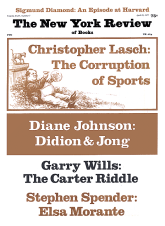It has been cruelly said that the English have a sense of themselves as a nation, but not as a people. The French or Spanish democrat can point to cataclysms and caesurae in history which have allowed “the people” to define itself and to establish its own tradition and mythology distinct from those of the ruling groups. England has had no such experiences since the well-expunged seventeenth-century revolution, and is still supposed to have a single “history.” Whatever their differences over priorities and interpretations, the liberal historians who have dominated British history have never allowed that the working class might be entitled to see the past as a story with quite different leaders and struggles and tragedies. This has disturbed younger and more radical historians for most of the postwar period, and they have begun—like intellectual nationalists cooking up a culture for a suppressed linguistic group—to compose that missing tradition on their own.
History Workshop is the most impressive collaborative effort that such dissident scholars have so far undertaken. It comes from a large and brilliant group of “social historians,” firmly on the political left, who have been centered for a good many years at Ruskin College, Oxford, and have used its strong connections with the trade unions for research and recruitment. The journal arises from the History Workshop meetings at Ruskin, and from the social history seminar at Oxford. Workshop and seminar in turn owe much to Eric Hobsbawm and the notion of the deviant—whether “lunatic” or “criminal”—as primitive social rebel. During the 1960s stormy arguments used to rattle the Oxford seminar windows over the role of “mad doctors” in eighteenth-century England or—to recall a particularly wild controversy—about whether bushwhackers in Van Diemen’s Land in 1810 were palaeo-socialists or thieving bums.
The Journal is far broader than that. Its aim is “to bring the boundaries of history closer to people’s lives,” and it includes discussions of work, family, sex barriers, industrialism, schools, homes. It is scholarly and also, as something of this kind should be, a pleasure for the nonspecialist imagination.
Some features run in both of the first two issues. Tim Mason’s two-part examination of “Women in Germany, 1925-1940” provides statistics and analysis for one of the mysteries of German studies: the failure of the Nazis to conscript or even effectively to mobilize women for rearmament and the war effort, and the way in which the regime’s distrust of the population, rather than its official “home and babies” ideology, frustrated the efforts to get women into industry on any scale. Mason ends with a sharp reflective passage about the role of the family in capitalism (“the small family household is certainly indispensable to business interests, precisely because it is outstandingly wasteful and inefficient”) and about the “higher cynicism” of governments which encourage the family as an agency that will reconcile it to the increasingly alienated world outside.
“The Martyrdom of the Mine” is a reprint, also in two parts, of the forgotten memoirs of a Victorian coal-miners’ organizer, and there is also an account of how nineteenth-century railway workers developed their own intricate and dedicated discipline. Two excellent articles discuss history on television—an interest in the mass consumption of history and its packaging is typical of the Workshop. In the first Jerry Kuehl describes his problems in producing the “World at War” series for British television and in the second Gudie Lawaetz gives an account of making her impressive film compiling the history of May’68 in Paris.
There is much in these two issues about archives and the editors plan regular articles about museums “for the people” (e.g., the accounts in these two issues of museums in Buckinghamshire, Emilia, and at Ironbridge Gorge in Shropshire). Three articles about workers’ libraries show another continuing interest of the Workshop group. In my view, the most interesting articles, apart from Tim Mason’s, are Gwyn Williams’s superb essay in the first issue on “Welsh Indians: The Madoc Legend and the First Welsh Radicalization” and Charles van Onselen’s “Randlords and Rotgut” in the second. Williams explains why Welsh Jacobins had to prove that North American Indians were descendants of Madoc, prince of Gwynedd; van Onselen examines the distilling racket in the Rand gold rush. Both are intelligent, revealing, and frequently funny. This journal is, to my mind, the most promising new start in British historical studies in years.
This Issue
April 28, 1977



